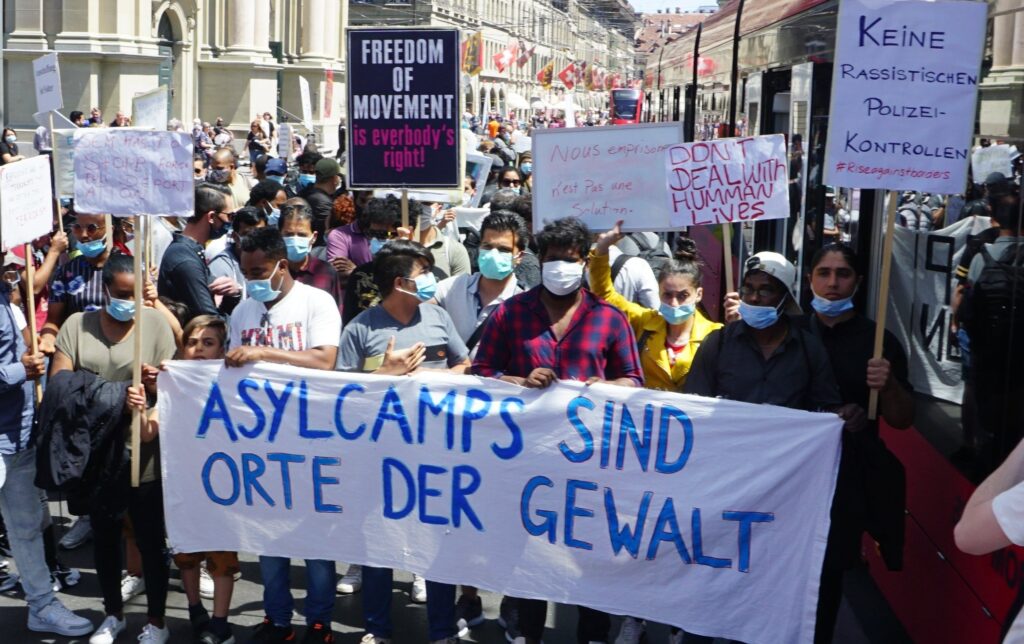INFO///DE///EN///FR
EN: Federal Asylum Camps: „Respect, human rights, safety and health are lacking here“
FR: Camps d’asile fédéraux : „Le respect, les droits fondamentaux, la sécurité et la santé font défaut ici„

An einem der ersten Morgen nachdem ich ins Bundesasylcamp kam, wachte ich auf. Vor meinem Bett stand ein Securtiy und fragte mich: „Was tust du?“ Ich fragte verängstigt, was er hier mache, immerhin lebte ich ja in diesem Raum. Er antwortete, er mache nur seinen Job. Danach wusste ich, dass solche Situationen im Bundesasylcamp Alltag sind. Die Security kann einfach reinkommen. Wenn sie anklopfen, ist das eine Ausnahme. Das Verhalten der Security ist echt schlecht. Sie respektieren uns nicht. Wer nachfragt, warum etwas so und nicht anders läuft oder wer sie kritisiert, gerät unter Druck. Mehrmals informierte ich mich bei der Security über meine Rechte. Ich erhielt nie eine befriedigende, genaue Antwort. Stattdessen schickten sie mich weg. Als ich mich nach dem Namen der Person erkundete, um mich zu beklagen, erhielt ich diesen auch nie.
Die Security braucht den Pfefferspray sogar dann, wenn die Kinder in der Nähe sind. Die Kinder haben deshalb auch Angst vor ihnen. Es kommt auch immer wieder vor, dass die Security Kinder anschreien oder grob disziplinieren.
Auch die Räume, wo sie uns einsperren, sind ein Problem. Einmal war ich dabei, als eine Frau im Raum landete. Sie hatte sich nur bei der Securty beklagt. Sonst nichts. Sie fragte nach, wo sie sich über die Security beklagen könne. Wir alle haben gesehen, dass sie nichts Böses getan hatte. Trotzdem landete sie für zwei Stunden dort. Es hiess, sie habe die Security angegriffen. Im Raum sah ich ein anderes Mal eine Frau. Ab 3 Uhr in der Nacht bis 10 Uhr am Morgen war sie dort drin. Sie trug nur Unterwäsche.
Wenn Kinder untereinander spielen, drohen sie einander im Spiel: „Ich stecke dich in den Raum“.
Jene, die kein Deutsch, Französisch oder Englisch sprechen, haben kaum Chancen sich Gehör zu verschaffen. Die Verdolmetschungen und die Übersetzungen sind sehr schlecht. Meist müssen wir uns untereinander aushelfen. Wer keine eigene Übersetzung auftreiben kann, wird zum Beispiel kaum einen Arzttermin erhalten.
Der Zugang zum Gesundheitssystem ist ein weiteres Problem. Es braucht echt Ausdauer, um Pflege zu erhalten. Wer krank ist, wird meist nur mit Pillen versorgt. Aber wer wirklich Medikamente verschrieben bekommt, muss meist längere Tage warten. Auch wenn diese dringend benötigt würden, geschieht erst nach mehrfachem Nachfragen und langer Zeit der Ungewissheit etwas. Dieses Warten in der Ungewissheit ist typisch. Das ist schrecklich, denn teilweise verschlechtert sich in dieser Zeit der Gesundheitszustand. Das beobachtete ich am Fall einer allergischen Reaktion auf ein Nahrungsmittel. Das Problem hätte mit Medikamenten behandelt werden können, wenn sie da gewesen wären.
Von 8:30 Uhr bis 10:30 Uhr müssen wir jeweils aus unserem Schlafraum. Sie sagen, es geht darum, die Räume zu reinigen. Doch dafür braucht es nur 10 Minuten. Wer sehr höflich fragt, kann teilweise eine Ausnahmeregel verhandeln und kann schneller in den Schlafraum zurück. Teilweise geht aber auch das nicht.
Eine weitere Sache, über die nicht viel gesprochen wird, sind die Transfers. Alle, die ich kenne, wurden mindestens einmal von einem Camp zu einem anderen transferiert. Das ist verwirrend und niemand weiss warum.
EN: Federal Asylum Camps: „Respect, dignity and human rights are lacking here“
„One of the first mornings after I came to the camp, I woke up. A securtiy was standing in front of my bed and asked me, „What are you doing?“ I asked, alarmed, what he was doing here, after all, I was living in this room. He replied that he was just doing his job. After that I knew that such situations are everyday life in the federal asylum camp. The security can just come in. If they knock, it is an exception. The behavior of the security is really bad. They don’t respect us. Whoever asks why something is done this way and not another way, or whoever criticizes them, comes under pressure. Several times I asked the security about my rights. I never received a satisfactory, accurate answer. Instead, they sent me away. When I inquired about the person’s name to complain, I never received it either.
Security uses the pepper spray. Even when the children are around. Therefore, the children are also afraid of them. It also happens again and again that the security yells at children or disciplines them roughly.
The rooms where they lock us up are also a problem. Once I was there when a woman ended up in the room. She had only complained to the Securty. nothing else. She asked where she could complain about security. We all saw that she had done nothing wrong. Nevertheless, she ended up there for two hours. It was said that she had attacked the security. Another time I saw a woman in the room. From 3 o’clock in the night until 10 o’clock in the morning she was in there. She was wearing only underwear.
When children play among themselves, they threaten each other in the game, „I’ll put you in the room.“
Those who do not speak German, French or English have little chance to make themselves heard. The interpretation and translations are very poor. Most of the time we have to help each other out. For example, if you can’t find your own translation, you will hardly get a doctor’s appointment.
Access to the health care system is another problem. It really takes perseverance to get care. Those who are sick are usually only given pills. But those who are really prescribed medication usually have to wait longer days. Even if these would be urgently needed, things happen only after multiple requests and a long time of uncertainty. This waiting in uncertainty is typical. This is terrible, because sometimes the health condition worsens during this time. I observed this in the case of an allergic reaction to a food. The problem could have been treated with medication if they had been there.
From 8:30 to 10:30 we have to leave our dormitory each morning. They say it is to clean the rooms. But it only takes 10 minutes to do that. If you ask very politely, you can sometimes negotiate an exception and get back to the dormitory faster. But sometimes this is not possible either.
Another thing that is not much discussed is the transfers. Everyone I know has been transferred from one camp to another at least once. This is confusing and no one knows why.“ Testimonial of a person isolatied in a Federal Asylum Camp.
FR: Camps d’asile fédéraux : le respect, la dignité et les droits de l’homme font défaut ici
Un des premiers matins après mon arrivée au camp, je me suis réveillé. Un agent de sécurité se tenait devant mon lit et me demandait : „Qu’est-ce que tu fais ? J’ai demandé, effrayé, ce qu’il faisait ici, après tout je vivais dans cette chambre. Il a répondu qu’il ne faisait que son travail. Après cela, je savais que de telles situations étaient courantes dans le camp d’asile fédéral. La sécurité peut tout simplement entrer. S’ils frappent, c’est une exception. Le comportement de la sécurité est vraiment mauvais. Ils ne nous respectent pas. Quiconque demande pourquoi une chose est faite de cette façon et pas d’une autre, ou quiconque les critique, est mis sous pression. J’ai demandé plusieurs fois à la sécurité quels étaient mes droits. Je n’ai jamais reçu de réponse satisfaisante et précise. Au lieu de cela, ils m’ont renvoyé. Lorsque je me suis renseigné sur le nom de la personne, je ne l’ai jamais reçu non plus.
La sécurité a besoin du spray au poivre même lorsque les enfants sont présents. Les enfants ont donc peur d’eux. Il arrive aussi de temps en temps que la sécurité engueule les enfants ou les discipline rudement.
Les pièces dans lesquelles ils nous enferment posent également problème. Une fois, j’étais là quand une femme s’est retrouvée dans cette pièce. Elle n’avait fait que se plaindre auprès de la sécurité. Rien d’autre. Nous avons tous vu qu’elle n’avait rien fait de mal. Pourtant, elle a fini par rester deux heures enfermé dans la pièce. Ils ont dit qu’elle avait attaqué la sécurité. Une autre fois, j’ai vu une femme dans cette pièce. De 3 heures à 10 heures du matin, elle était là. Elle ne portait que ses sous-vêtements.
Lorsque les enfants jouent entre eux, ils se menacent en jouant : „Je vais te mettre dans la pièce“.
Ceux qui ne parlent pas l’allemand, le français ou l’anglais ont peu de chances de se faire entendre. L’interprétation et les traductions sont très médiocres. La plupart du temps, nous devons nous aider mutuellement. Par exemple, si vous ne pouvez pas trouver votre propre traducteur, vous aurez du mal à obtenir un rendez-vous chez le médecin.
L’accès au système de santé est un autre problème. Il faut vraiment de la persévérance pour obtenir des soins. Les personnes malades ne reçoivent généralement que des pilules. Mais ceux à qui l’on prescrit vraiment des médicaments doivent généralement attendre plus longtemps. Même s’ils sont nécessaires de toute urgence, les choses ne se passent qu’après de multiples demandes et une longue période d’incertitude. Cette attente dans l’incertitude est typique. C’est terrible, car parfois l’état de santé se détériore pendant cette période. J’ai observé cela dans le cas d’une réaction allergique à un aliment. Le problème aurait pu être traité avec des médicaments s’ils avaient été là.
Chaque jour, de 8h30 à 10h30, nous devons sortir de notre dortoir. Ils disent que c’est pour nettoyer les chambres. Mais cela ne prend que 10 minutes. Si vous le demandez très poliment, vous pouvez parfois négocier une règle d’exception et retourner plus rapidement dans le dortoir. Cependant, dans certains cas, cela ne fonctionne pas non plus.
Une autre chose dont on parle peu, ce sont les transferts. Tous ceux que je connais ont été transférés d’un camp à l’autre au moins une fois. C’est troublant et personne ne sait pourquoi.
